In regex101: https://regex101.com/r/FM88LA/1
In my browser console:
x='"AbCd123|999"';
"\"AbCd123|999\""
x.match(/[^\""|]+/)
Array [ "AbCd123" ]
Using sed in the shell:
(base) balter@winmac:~/winhome/CancerGraph/TCGA$ echo '"AbCd123|99999"' | sed -En 's/([^\"|]+)/\1/p'
"AbCd123|99999"
(base) balter@winmac:~/winhome/CancerGraph/TCGA$ echo '"AbCd123|99999"' | sed -En 's/\"([^|]+)/\1/p'
AbCd123|99999"
